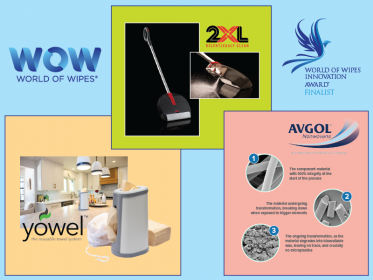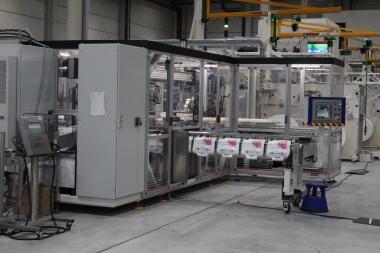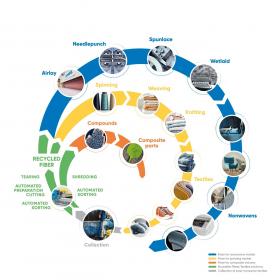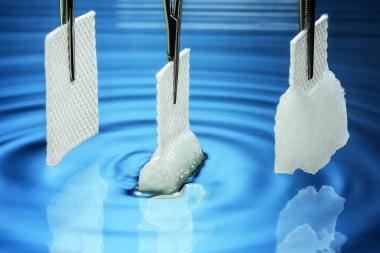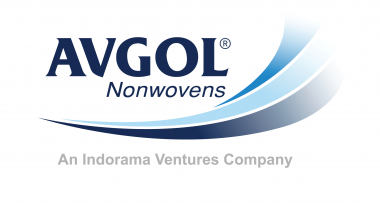Three Finalists Announced for the 2023 World of Wipes Innovation Award®
2XL Corporation, Avgol Nonwovens, and Yowel to compete for Award
INDA, the Association of the Nonwoven Fabrics Industry, announced the three finalists for the World of Wipes Innovation Award®. The Award will be presented at the 17th annual World of Wipes® (WOW) International Conference, July 17-20, at the Atlanta Marriott Marquis in Atlanta, Georgia.
The three products vying for this Award are a cleaning and disinfecting device from 2XL Corporation, a wipe utilizing biotransformation technology from Avgol Nonwovens, and a reusable towel dispensing system from Yowel.
The winner will be announced on July 20th at 11 am. The three companies competing for the Award are:
Windup by 2XL Corporation
Meet the Windup: a groundbreaking new device that can clean and disinfect your home using a self-advancing microfiber roll that you never have to touch. Just one roll will clean your kitchen over 50 times. An innovative one-touch revolving roll and a versatile spray system that allows use of your favorite floor cleaner or our specially formulated disinfecting solution. No more stopping to change expensive pads or change filthy water. Get wound up for Windup.
Nonwoven wipe using biotransformation technology by Avgol Nonwovens
This innovative spunlace wipe utilized advanced biotransformation technology developed jointly by Indorama Ventures and Polymateria. Meeting the BSI PAS 9017 specification, this wipe in the event it becomes fugitive, and exposed to heat, sunlight, air and moisture will transform into a harmless, bioavailable wax at its end-of-life, eliminating microplastic pollution. Compatible with mechanical recycling and combatting ‘fugitive’ waste, this wipe represents a significant leap towards eco-friendly, sustainable nonwoven hygiene products.
The Yowel™ System by Yowel
Ready to help the earth and save money…every day? Yowel is a patented system for dispensing reusable towels. Instead of a roll of paper towels, place a Yowel full of reusable towels into your paper towel holder – or choose the countertop model, and you’re immediately reducing your paper towel consumption. The Yowel System has 40 reusable towels and a mesh bag for used towels. Save money and help Mother Nature.
INDA’s Technical Advisory Board selected the finalists based on the creativity, uniqueness, and technical sophistication employed in finding novel ways to expand the utilization of nonwovens. Categories considered for the award were wipes related raw materials, roll goods, converting, packaging, active ingredients, binders, additives, and end-use products.
Nice-Pak’s SecureFLUSH® Technology Flushable Wipes received the 2022 World of Wipes Innovation Award for their unique, 100% cellulose nonwoven that is strong enough to clean, yet break apart rapidly, when flushed. A specialty “lock and key” design of plant-based fibers and formula leverages patent-pending technology to break apart five times faster than the leading brand of two-ply toilet paper and ensure responsible care of plumbing and wastewater. SecureFLUSH® Technology Flushable wipes are available in Walmart, Amazon, and at Nicencleanwipes.com.
INDA


